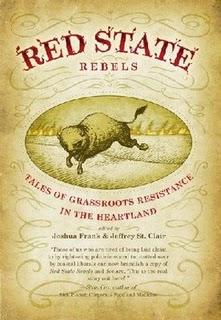Red State Rebels: Tales of Grassroots Resistance in the Heartland

As we enter the final countdown to the 2008 U.S. Presidential election, we will hear political pundits talk in red- and blue-state terms. The shorthand goes like this: blue states are progressive and urban, while red states are conservative and rural. And those purple states? Well, forget about those states; they're the bisexuals of electoral politics. We just don't know what to do with them. (wink)
As someone who has spent most of her life participating in radical social movements in the red states I call home, I was hoping Joshua Frank and Jeffrey St. Clair's edited volume, Red State Rebels, would dispel the myth that activism is something that only exists on the coasts. To this end, the authors were successful. Within these 300+ pages, short, easy-to-read essays reveal that resistance to American hegemony comes in many forms.
For almost a hundred years, the farmers of North Dakota have been engaging in non-corporate models of doing business. From buying gasoline from cooperative gas stations to selling their agricultural products to producer cooperatives, the farmers of North Dakota have been sticking it to "the corporate man" for some time. And now, in the twenty-first century, these farmers are winning the fight against Monsanto's genetically-engineered (GE) seed and corporate greed - not for environmental reasons, but for economic ones! When Monsanto started punishing farmers for brown-bagging (replanting seed from their own harvest, rather than buying new seed), farmers organized and offered Monsanto the first anti-GE wheat campaign organized by American farmers. Because farmers were the organizers of the movement, Monsanto was forced out of the state's wheat production, teaching us all an important lesson in corporate resistance: kill the demand for a product, and the corporations will leave.
This issue of farmers resisting corporate greed is just one of the issues presented to us in this forty-three essay volume. Written in an accessible, investigative journalism style, these essays educate readers about all sorts of issues affecting rural America: the depletion of the Ogallala Aquifer, the cost of using your First Amendment rights in front of conservative police, polluted land left from industry long gone, and resistance to upscale resorts attempting to destroy nature in order to bring city-folk out into the former wilderness. Many essays focus on individuals who experience repression for being the "opinionated weirdo" in town—a common target for rural law enforcement.
Except occasionally, most of the essays focus on environmental and land issues. And while this is not overly surprising considering the environmentalist backgrounds of both of the co-editors, it unfortunately upholds the idea that red states are entirely rural, which they are not. Not a single essay looks at activist organizing efforts in college towns, a place where many red state rebels find solace and build communities of support to resist becoming the lone weirdo target. Instead red state rebels are painted as solitary fighters, taking on "the man" or law enforcement with a rugged individualist fervor.
Also, with the exception of one article on rebuilding New Orleans, this volume skips over activist struggles in urban cities. Unfortunately, even when these articles deal with rural issues faced by people of color, the authors fail to embed their stories within a critical race or anti-racist framework. Few articles speak about gender issues and none even begin to touch on queer issues. Yes, there are articles that include people of color, women, and GLBTQ people, but there is no critical analysis of race, gender, and sexuality.
Despite these flaws, this edited volume is a must-read for those interested in buffing up their knowledge of grassroots resistance across the Heartland. Though the book too narrowly focuses on rural land and environmental issues, this content is especially thought-provoking and offers many new ideas for activist tactics. Since it's not written from an over-the-top radical or single ideological perspective, and since nowhere does the volume pretend that Democrats are all good and Republicans are all not good, this book would make an excellent gift for a friend or family member you feel needs to hear about resistance to the status quo.